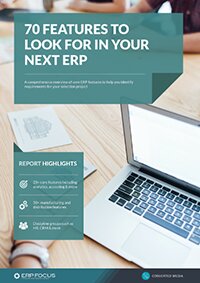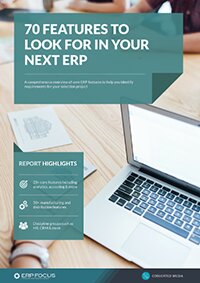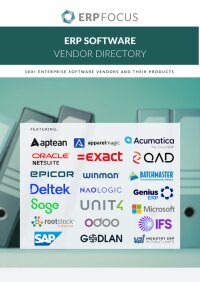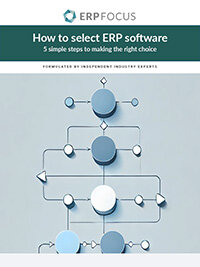7 ERP features every omnichannel retail business needs
You’ve heard of ERP. You’ve heard of omnichannel. But what about omnichannel ERP?
What is omnichannel ERP?
Omnichannel ERP is a type of Enterprise Resource Planning system, which has been especially designed with an omnichannel focus in mind so that you’re able to centralize and streamline your workflows, processes, and data in a way that supports a consistent shopping experience across all channels and devices.
In other words, with an omnichannel ERP, you can succeed at the very essence of omnichannel retail.
Although we could write thousands of words on the subject of omnichannel ERP, we thought it would be better to focus on seven core features you must look for when selecting a new ERP system for your omnichannel business.
1. Robust ecommerce integrations
For any growing omnichannel business in today’s world, your ecommerce integrations are ones that must be robust and able to scale with you. Your ERP should be able to integrate with each of your chosen channels, whether it be a leading ecommerce channel or a marketplace like Amazon and eBay. Furthermore, you should check how many orders per hour can be downloaded into your ERP from the channel and how frequently inventory updates occur. For instance, at Brightpearl, we support the download of up to 25,000 orders per hour combined with real-time inventory updates, ensuring your business is never left behind during peak season events, flash sales or when an unexpected spike in interest for your products hits.
2. Multi-location inventory management
Omnichannel businesses are much more likely to use a number of websites, store locations, and marketplaces than other retail business as they know the importance of being where the customer is. Your ERP should support your need to have different locations for storing inventory and the ability for each location to speak to a specific channel; your shop stockroom and point of sale for example, or your main warehouse for online orders as another.
3. Real-time data management
Operating across multiple channels is a complex beast, especially if you don’t have the right back-office systems in place that can facilitate real-time inventory, warehouse, order and accounts management. When researching new ERP solutions, ensure you find out what data is integrated and how frequently updates happen. In our world, we believe everything should be in real-time or near real-time to ensure your customers are never left disappointed.
Check out our free ERP features guide to identify your ERP requirements during selection
4. Powerful CRM functionality
One of the main focuses of omnichannel retail is in completely understanding your ideal customer profile so that you can offer personalized recommendations, fast service, and consistent experience that they expect. But how can you hope to achieve this if your CRM isn’t full of detailed information about your customers? Our advice would be to look for systems that enable the easy flow of information across the business, so that no matter who your customer is speaking with, they’re getting the same level of service and information. Ideally, your CRM database would be updated automatically with every order, return, email, support ticket, and live chat message.
5. Integrated warehouse management
A major part in being able to achieve consistency within your business is integrating every facet of it. You should expect that your ERP is able to integrate your inventory, orders, purchases, accounts and CRM data, but what about your warehouse management? There are many systems out there that rely on outsourced warehouse management systems. But with this, you run the risk of outdated information and slow customer service. Therefore, we would always be quick to recommend systems that try to keep as much of your data in one place as possible, which includes WMS.
6. Efficient point of sale
Many omnichannel businesses today recognize the benefits of both online and brick and mortar channels. If you’re also keen to rock the world of in-store retail, then you’re going to need an efficient point of sale at your fingertips. There are ERP systems out there that have their own built-in point of sale, which helps to ensure the fast flow of information across your channels so that if the last item is bought in-store, your online channels can also be updated quickly.
7. Retail automation
We’ve already discussed the importance of consistency in order to succeed at omnichannel. One of the easiest ways to achieve that is through automation so that your employees only need to focus on exceptional cases. If your chosen ERP vendor is able to offer automation as part of its package, then we would highly recommend utilizing this as much as possible. Inventory updates, shipping notifications, accounts journal creation, fulfillment, order status updates, routing orders to the relevant warehouse… you name it, automation can handle it. This allows you to free up more of your time to focus on the things you love most about retail: launching new product lines, expanding into additional territories, spending time with customers and finding innovative new approaches to capture your customers’ attention.
Conclusion
Gone are the days when ERP and back-office systems only needed to fulfill your basic requirements. Vendors are now expected to launch new products that will not only fulfill the basics of omnichannel but allow you to master advanced strategies and concepts as well. We say have fun in building your requirements list -- you may be surprised with just how much next-gen systems are able to cope with to help make your life easier.
Free white paper

70 features to look for in your next ERP
A comprehensive guide to help you identify requirements for your ERP selection

Featured white papers
-

70 features to look for in your next ERP
A comprehensive guide to help you identify requirements for your ERP selection
Download -

ERP Software Vendor Directory
Put the most comprehensive ERP vendor directory on your desk today
Download -

How to Select ERP
Learn to select your ERP in 5 easy steps by following our expert's advice
Download
Related articles
-

Top benefits of ERP inventory management
How an ERP helps inventory management including four key advatages
-

Secret KPI: Why Your ERP Implementation Team Matters More Than Software
Learn how Godlan ensures successful ERP implementation for manufacturers with proven strategies &...
-

Top ERP systems for small businesses
Which ERP solutions are best for small business needs? Information on features, scalability and m...

